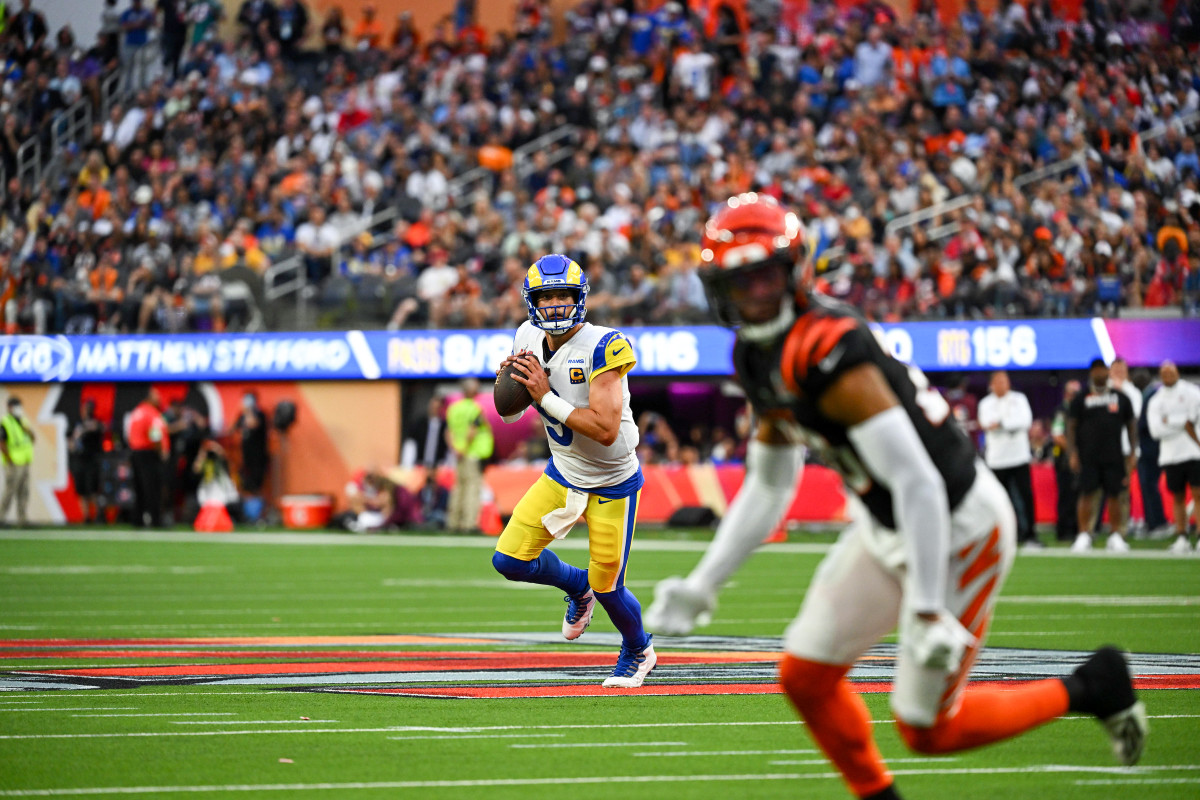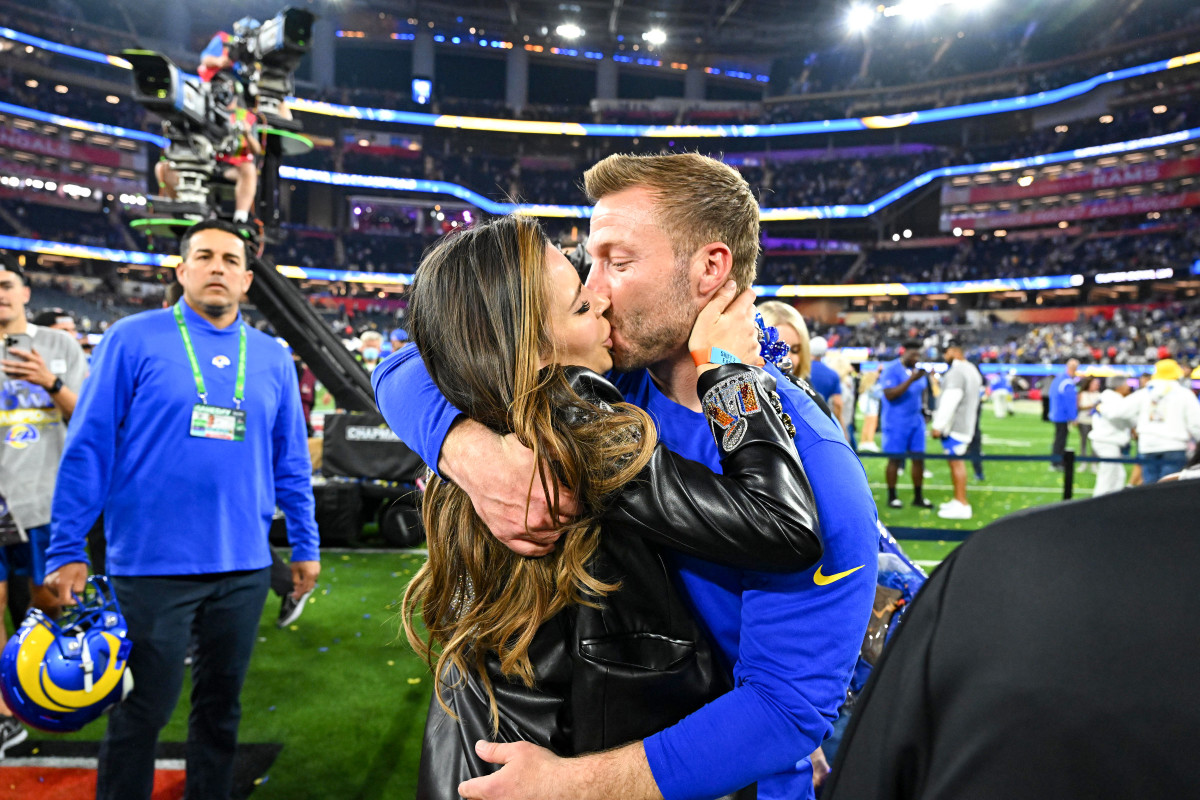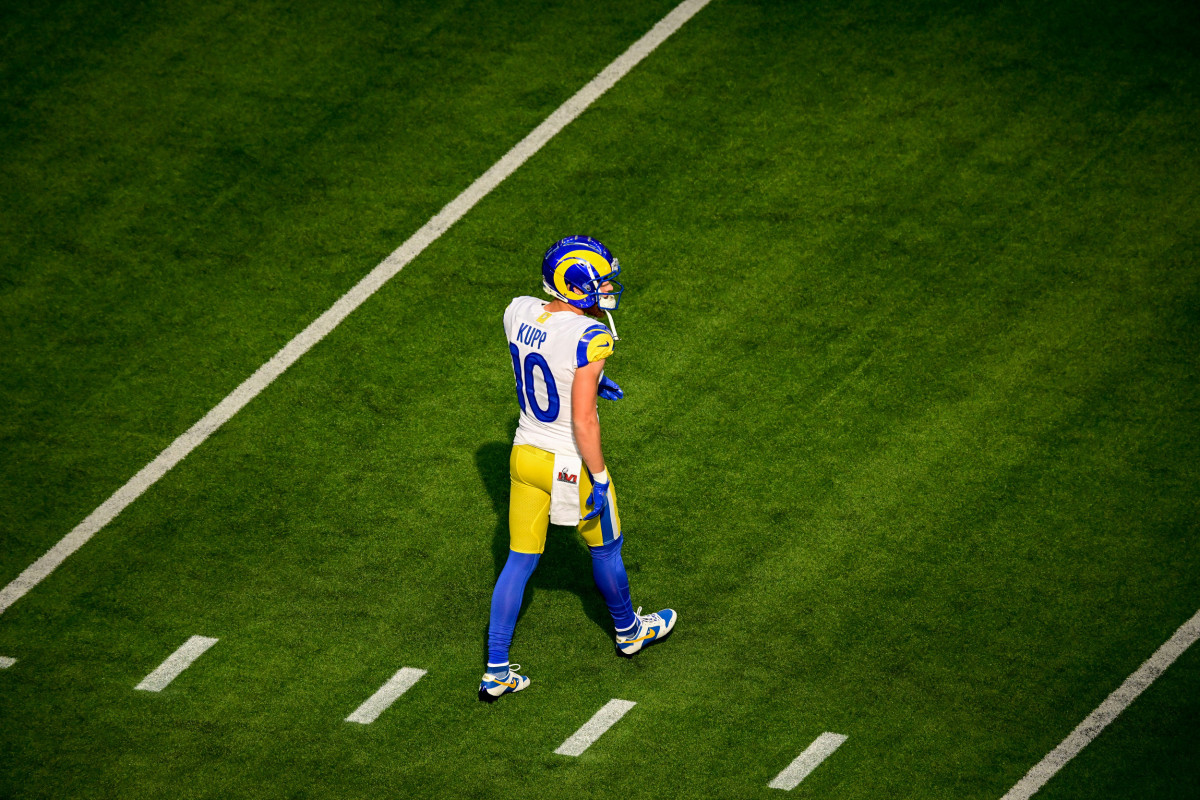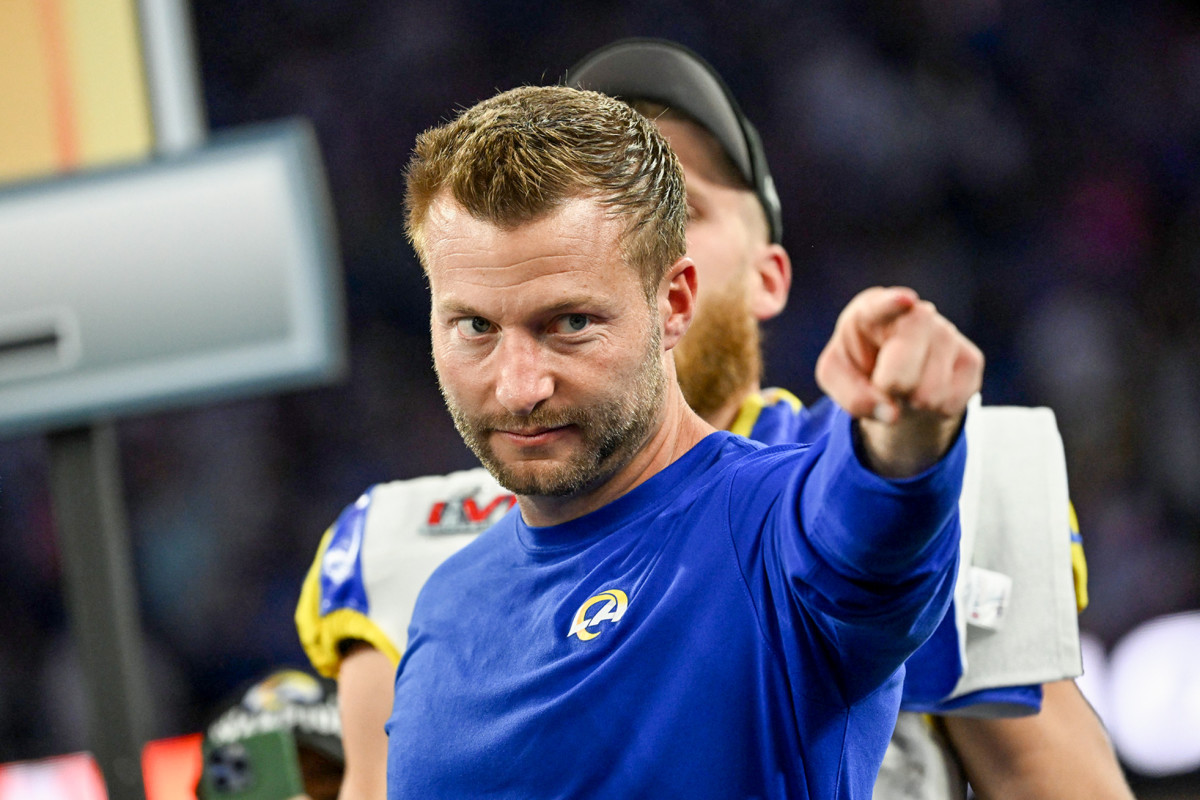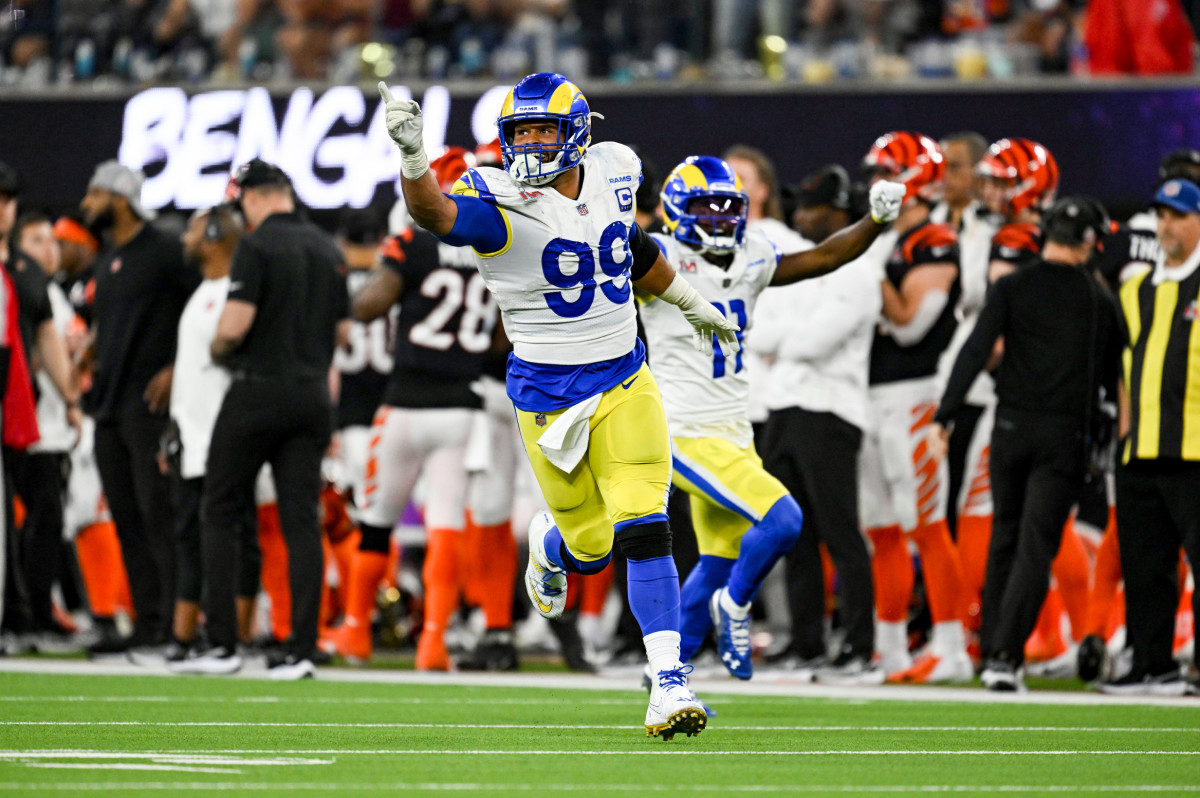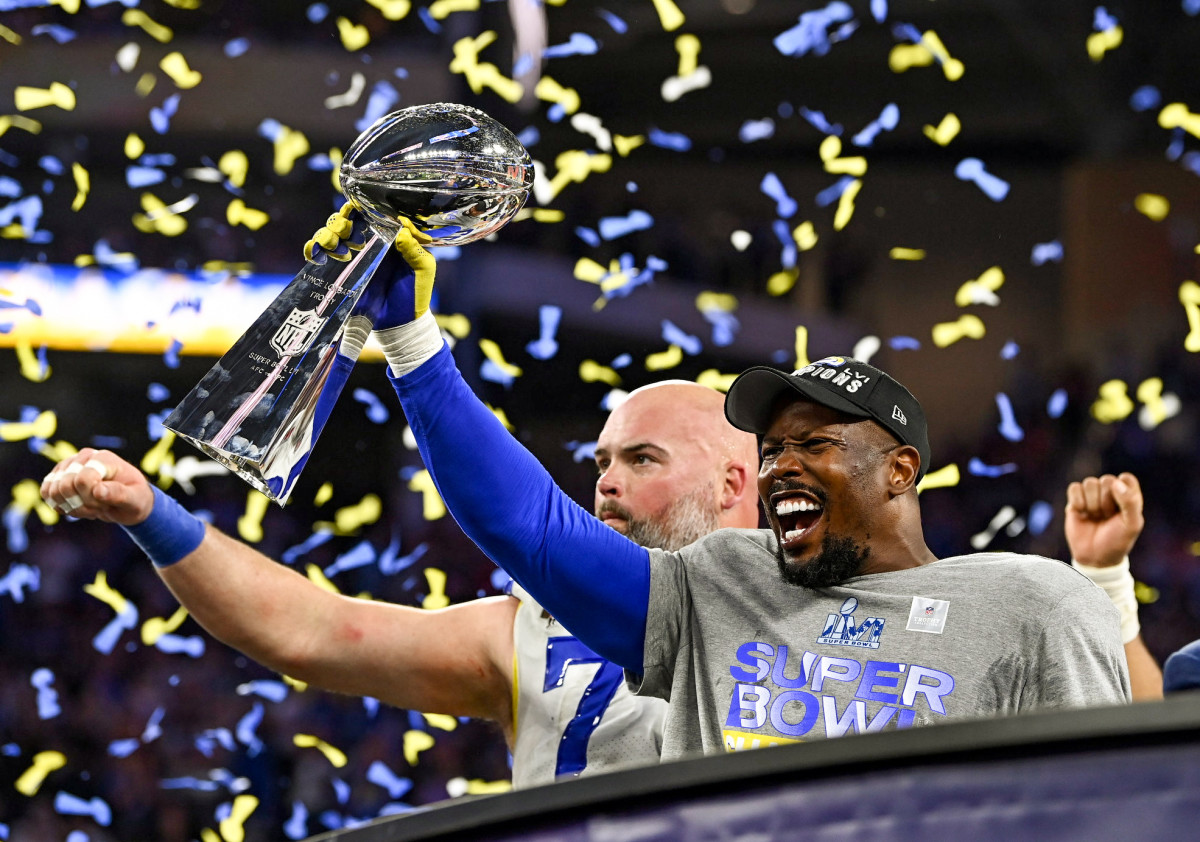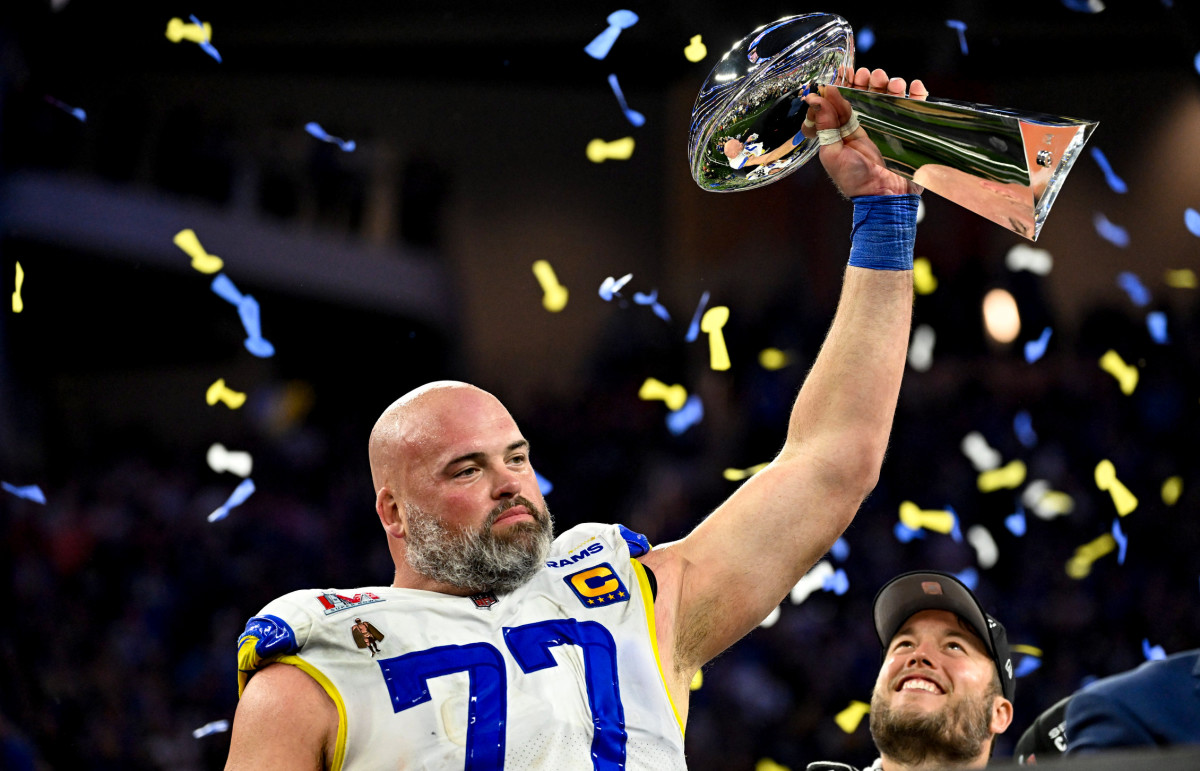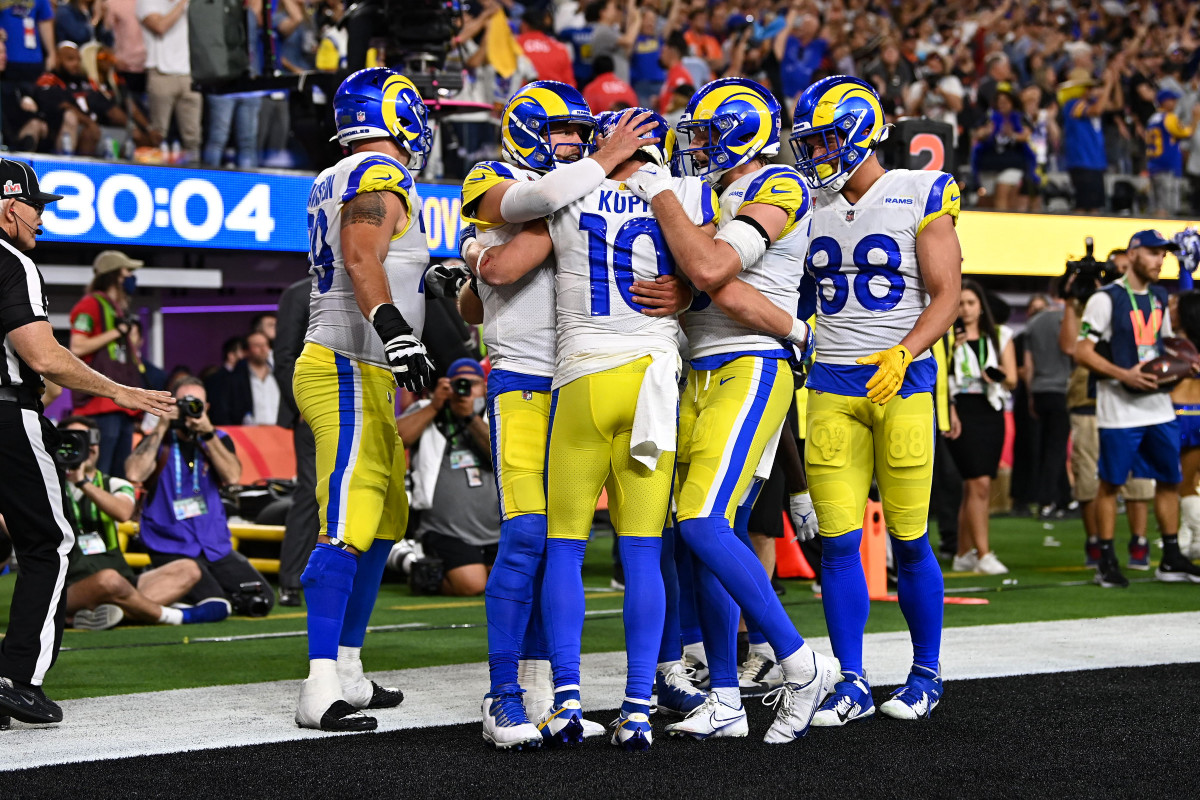https://www.si.com/nfl/2022/02/14/u...upp-donald-rams-super-bowl-season-daily-cover
How the Rams Got Away, Found One Another, Then Found a Way
The story of how the Super Bowl champions came together is beyond belief—even for those who lived it.
The trip that changed the 2021 NFL season started with an unusual forecast for Los Angeles: gloomy, with a significant chance of rain. The weather matched the mood of the Rams football team, after the Packers ended their season with a bludgeoning at Lambeau Field.
Veronika Khomyn knew her fiancé, Sean McVay, needed to get away. So she called Melissa Whitworth, whose husband, Andrew, played left tackle for McVay. “Do you want to get out of here?” Khomyn asked. No hesitation. Of course they did.
Both couples—and all four of the Whitworth children—departed that Friday, Jan. 29, 2021. They flew to Cabo San Lucas and settled in at the Chileno Bay Resort. The plan: relax, swim, sleep and down more than a few drinks with fresh fruit and mini umbrellas in them, all to forget a second forgettable season after their Super Bowl appearance in the ’18 season. None of them knew then the dizzying chain of events that phone call would set in motion. “Honestly, it’s not even believable,” Melissa says. “But it’s the truth.”
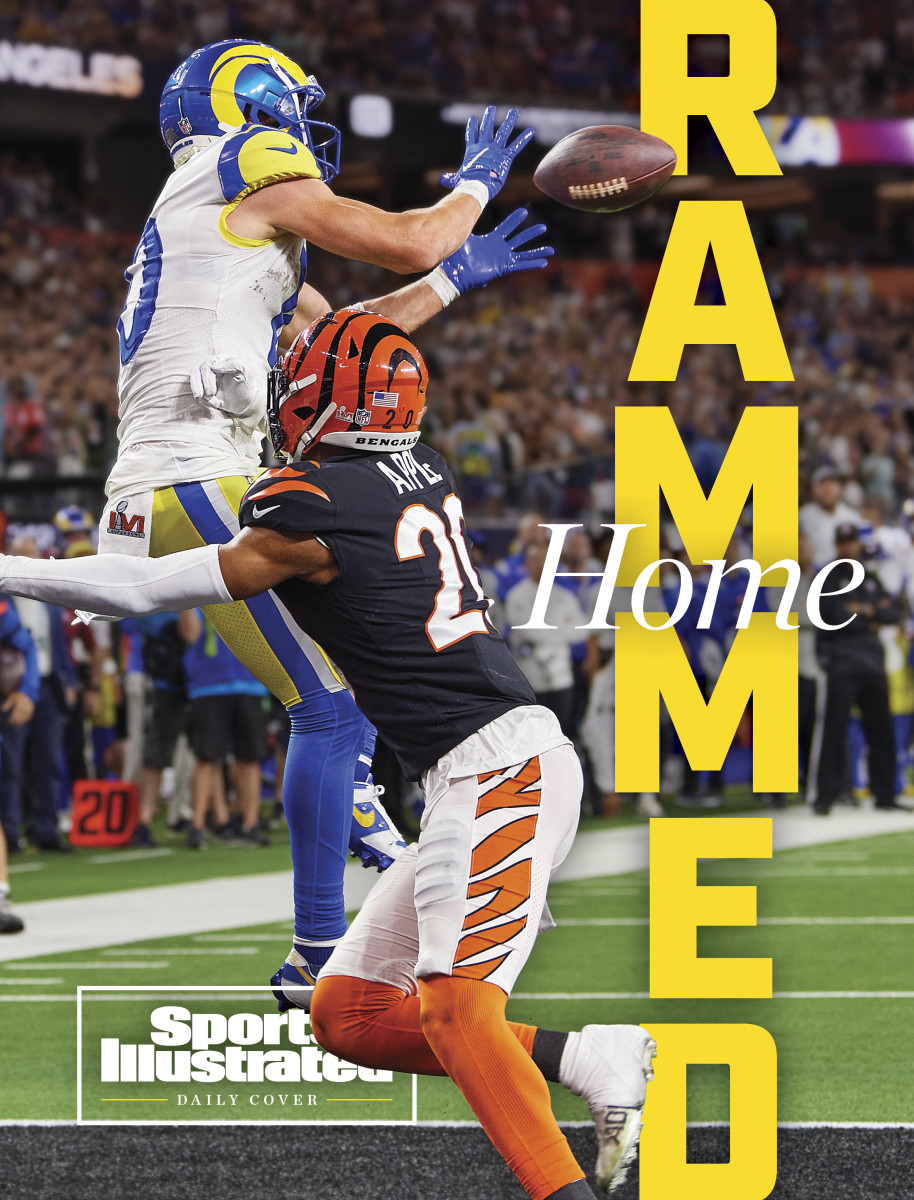
John W. McDonough/Sports Illustrated
• Get the Rams Super Bowl Commemorative Issue of Sports Illustrated
Retired NFL guard Clint Boling was home in Atlanta, when he realized mutual friends were vacationing in the same place and wanted to connect them. He sent Andrew Whitworth a text:
Matthew Stafford wants to play golf with you. Whitworth replied:
Give him my number.
Originally, Stafford had intended to vacation at Baker’s Bay in the Bahamas. But with a hurricane approaching he made a last-minute, fateful switch.
Stafford and Whitworth met Saturday morning at the Chileno Bay Club Golf Course, its members-only fairways lined with arroyos, cacti, swaying seagrass and steep seaside cliffs.
Whitworth could sense Stafford’s heightened stress level. Both play regularly and boast low handicaps, scoring in the 70s. But on this day, though surrounded by paradise, something seemed off. His phone buzzed and buzzed and buzzed.
Sensing an internal conflict, Whitworth spoke from his own experience. In 11 seasons with Cincinnati, the Bengals had made six postseason appearances without netting a single victory. He had become a pillar, both in the local community and at left tackle on the offensive line. Change was scary, yet necessary, and one person had made it less terrifying: McVay. Whitworth didn’t want to sway Stafford. Whitworth told him, “Listen, I want you to think on this, because it’s the rest of your life; it’s your legacy. You should go where you feel most comfortable.”
Whitworth did mention he had told McVay about the round. He also shared McVay’s response:
Dude,
he’s up to be traded,
and I’d love to talk to him. McVay then messaged a group of Rams executives, writing, “You’re not going to f------ believe this. Stafford is in town.”
Soon afterward, coach and quarterback met at the pool, sharing stories and cocktails, chatting for more than an hour. McVay had learned of Stafford’s availability while watching the NFC championship game the previous weekend, which led him to his happy place: the film room. What McVay saw—the arm talent, processing speed, consistency, improvisation and no drop-off as the quarterback entered his mid-30s—intrigued him. But more than that, he saw an adaptable competitor who could manipulate coverages by throwing from different positions, using varied arm angles, slinging deep passes on the move. The Stafford he analyzed was at his best in the most difficult situations.
McVay called Stan Kroenke from Cabo, the Rams owner, and made his pitch: expensive, no guarantee, but worth it. “I trust you,” Kroenke told him.
That evening, Jan. 30, the Staffords and the Whitworths went to a restaurant at the resort for drinks. Stafford wore board shorts and a dark gray T-shirt with a U.S. flag pocket. They ordered a round, then another, then dinner. Stafford stepped outside to take a phone call from his agent. Soon after, McVay walked in. Gesturing toward Stafford like a magician ready for the grand reveal, he said, “This is your new quarterback.”
Later that night, Stafford called his best friend from second grade, Pan Lucas, over FaceTime. Stafford is many things—driven, gifted, competitive as hell—but he is rarely outwardly emotional. He was, right then, for only the second time that Lucas could recall. The other instance was more than 12 years ago, the night before the 2009 NFL draft, when the Lions called to say they would select him and sign him to the richest rookie deal in NFL history.
This time, Stafford knew the work ahead—new team, new city, new teammates, plus heightened expectations. He also knew as well as any quarterback in the NFL how difficult it was to win, let alone a championship. But he was giddy, too. “I just got traded to the Rams,” Stafford said, “and I’m going to win a ring.”
What preceded that call can only be described as a FaceTime bonanza. McVay, Stafford and Whitworth dialed Rams executives. They buzzed Aaron Donald and Cooper Kupp. And they called Boling, who had set the whole thing in motion, and jokes now about the finder’s fee he’s not planning to collect.
The vibe was unmistakable: championship or bust.
On the Kupp call, McVay popped his perfectly placed spike into the frame as he sat down. Melissa snapped a picture shortly afterward: McVay and Stafford seated on a white couch, McVay’s left leg crossed, her husband flashing a peace sign behind them, everyone smiling.
The decision to take the trip. The destination of choice. Boling. The pool. Even the vacation the Staffords
didn’t take. “Canceled trip leads to a Super Bowl,” Boling says. Well, that and a few dozen other factors, so many random events, all connecting, to form a season built on strategy, stoicism, science and … kismet.
Flash forward to exactly one year later, almost to the minute, Jan. 30, 2022. Melissa Whitworth took another picture of the same group on a television screen. The graphic at the bottom showed the score of the game that sent L.A. back to the Super Bowl: Rams 20, 49ers 17. Only this time, in the frame, the same people are wearing uniforms and helmets and embracing. They’re still smiling, aware of the precise timing, the juxtaposition and everything that happened in those 12 months.
“Unbelievable,” Stafford told
Sports Illustrated four days before the Super Bowl. “Let’s just hope there’s another picture one year and two weeks after the first one.”
Before the Rams could win anything, let alone what they wanted to win most, losing tethered them. Before they hired McVay in 2017, he studied the Tao of Mike Shanahan in Washington, where the football team made two playoff appearances in McVay’s seven seasons.
Whitworth flew to meet L.A.’s new coach—then 31, the youngest in NFL history—that March. He sat next to Melissa on the plane and said, “You realize my dreams of winning the Super Bowl are over.” The Rams were young and had finished 4–12 the year before; if Big Whit chose L.A., he understood the parameters. He would swap losing for
more losing, rebuild the locker room and provide a steady veteran presence.
Melissa nodded, thinking, “That’s really sad.”
Whitworth missed a call from McVay en route to the airport for his flight home. But he saved the voicemail his coach left. McVay had plans, dreams, Super Bowl aspirations, and he laid them out so passionately and then connected how Whitworth fit within the framework he envisioned so precisely that Whitworth couldn’t help but believe him.
John W. McDonough/Sports Illustrated
Meanwhile, every year, right around the Super Bowl, Stafford and his closest friends took off for vacation. Sometimes they went to Mexico, other times to Hawaii. For 12 years, regardless of the destination, they didn’t talk a lot of football. And that’s because, during those years, Stafford needed a break from the tag that stuck to him, often unfairly—great player, elite arm, can’t win a big game.
Once, Stafford and friends flew to Costa Rica and stayed in a rain forest. One afternoon, he decided to climb up a cliff to the top of a waterfall. At the top, he sat down, next to a close friend, Steve Cundari, and he pointed toward the red frog sitting just to his right. Overhearing him, their guide shouted, “Do not touch it! If it bites you, we might have to cut off your arm!”—a limb as valuable as any in pro football.
Stafford possessed every trait necessary to win. His throws whistled, ripping up his high school teammates’ gloves. His arm “is a cannon,” Calvin Johnson says, “a bazooka,” that fired passes 82 yards in the air in practice. Johnson attributes the damage on his right ring finger to Stafford specifically; every time he wiggles a ring on there, around the bend, Johnson recalls what he used to tell Stafford every practice. “Come on, that s--- hurts.”
In truth, Stafford won as much with brains as bombs. His friends know him as a
Jeopardy! savant,
that guy who watches the show and answers every question. Others call him a “borderline genius,” with something close to a photographic memory, and an amateur mathematician.
Before the 2017 season, the same one in which Whitworth and McVay went to Los Angeles, Stafford visited 3DQB, the Huntington Beach training facility for numerous NFL quarterbacks. He wanted to add “technician” to his résumé, incorporating elements from Tom Brady, or Drew Brees. Stafford didn’t do anything drastic with his throwing motion—why would he?—but small tweaks in footwork and body positioning yielded instant and significant improvement. The time spent there eliminated the moments when Stafford would inexplicably flounder. “The stuff,” Dan Orlovsky says, “where you’re like, what the heck, bud?”
Better never translated to more wins in Detroit, not for the franchise that reaches elite levels of futility. The Lions have made all of 12 playoff appearances since 1958, and won only one of those games, 30 years ago, good for the longest drought in the NFL. The Lions aren’t Cleveland, or Buffalo, a franchise defined by losses that ripped out so many hearts. Their lot is worse than that; their futility is marked simply by the totality of their misery.
Stafford, they thought, could save them. Good Lord, did he try. He threw for more than 45,000 yards in a Lions uniform; played with a separated shoulder, or when he could hardly lift his throwing arm; and charged from behind for 39 comeback victories, or more than half of his win total (74) over 12 seasons. He was Mahomes before Mahomes, ducking down for arm angles, slinging touchdown passes sidearm, anything it took.
“He was one of the true, true original gunslingers,” says Dominic Raiola, Stafford’s center for most of his career. “But being in Detroit that long can really make you a hopeless person. You get that
loser tag.”
Sometimes, Stafford confessed to Cundari and others what he most wanted, beyond a healthy family: to play in—and win—big games. Stafford never wondered what it would take to change that narrative, because he knew. He needed to win.
As Les Snead watched his grand football experiment unfold over the course of the 2021 season, he decided that, starting on Jan. 1, he would borrow from the Roman philosopher Seneca and plunge into the Pacific Ocean. And he did that, every morning, every week, all the way until Super Bowl Sunday. When rain flooded the beaches near his home in Malibu, he jumped into the pool; sometimes, only to discover that the heat was on—a feeling he had come to know and embrace, even.
Snead lifted the Rams from 4–12, built a contender and fashioned the roster that reached the Super Bowl three seasons ago. In a football sense, he plunged repeatedly into the unknown, with splashy trades and signings and contracts that drew scrutiny and acclaim.
On Saturday, the house in Malibu was quiet. Snead was aware of an ESPN report that suggested McVay might be ready for a broadcasting hiatus similar to the one taken by McVay’s mentor, Jon Gruden. Snead grabbed a bag of 20 straws, the short and black kind he likes to chew on, dropped a “just reloaded last night,” and walked out the front door.
The sun beamed down on Malibu, the temperature rising to 88 degrees. For most of his life, as a scout personnel director in Jacksonville and Atlanta, then as the general manager of the Rams since 2012, Snead worked toward one goal, the reason he took plunge after plunge: win the Super Bowl.
As he jogged and walked, gliding by oceanfront mansions owned by Pierce Brosnan and Steven Spielberg, Snead considered Seneca, stoicism and the various ways that his people, football people, built their rosters. For most of recent NFL history, so-called super teams seemed destined to fail. But Snead did not view these Rams as a gamble, replete with unnecessary risk. He doesn’t see trading draft capital for veterans as that risky, if the circumstances call for it, not any more risky than finding Donald one year at pick 13 and Cooper Kupp in Round 3 three years later.
Pervasive notions—“he’s mortgaging the future”—strike his wife, Kara, a former broadcast journalist, as “lazy, easy” narratives. “He only does things that he believes in; he’s a process-oriented human where everything is thought out.”
Snead zones in on the stoic concept of memento mori. It translates, roughly, to,
Remember that you will die, the subtext being to live life with that understanding. To always be all-in. Asked if that concept applies to building football teams, he nods, then says, “Just don’t be scared.”
Both McVay and Snead read Ryan Holiday’s
Stillness Is the Key this offseason, but they didn’t always agree on what constituted “still.” McVay worked hours even high-powered lawyers would fear, and how much it took for him—and out of him—to compete could sound alarms, especially to McVay and those closest to him. The latter could be addressed, and the Rams considered several changes, such as lessening his workload, or shifting his coaching emphasis to strictly younger players. Snead liked to ask his coach, “Is there any way you can get an A on some tasks rather than an A-plus?”
Holiday took Snead last year to visit the billionaire entrepreneur Peter Thiel, who mentioned a favorite philosophy. What do I know that other people don’t? Snead loved that, saw himself in that, saying it “meshes or confirms or provides courage to follow your convictions.” Like adding Stafford, helping McVay to “sharpen his sword.”
Snead said that McVay sometimes found a particular notion goofy. But Snead clung to it as tightly as his routines. He wanted the Rams to engineer “anti-fragility,” the football team equivalent, he says, of a dropped iPhone that doesn’t break. The culture they created would sustain them, as they lost games and added players and tried to figure out work-life balances. Nobody, not even McVay, expected he would coach for decades like Bill Belichick. They worried that rate, for that long, might actually kill him, a concept McVay joked about at a news conference this past week.
As he walked into the ocean, Snead believed that not competing would hurt way worse for McVay than what it took for him to compete in a job he does better than almost anyone else in the world. He just had to find whatever stillness could be found. After everything, all the moments, the Rams’ season could be simplified, narrowed down to one sentence, a million other factors distilled to its essence. “Keep it simple,” Snead said, “if we don’t hire Sean, we’re probably not here.”
At that moment, 24 hours before kickoff, Snead dived into the ocean.
Of all the losses McVay hated, none can match Super Bowl LIII. Bill Belichick, according to a well-known assistant who once learned under him, essentially shut down the Rams’ offense by stopping one play McVay favored: a mid-zone run and all its endless variations, built on motions, shifts and play-action. “Bill took away his safety blanket,” the assistant says, “and everything else fell apart.”
McVay skipped the Rams’ party, choosing to sit and stew in his hotel room with Khomyn and his parents. “We love you,” Khomyn told him, “and we don’t need to talk, but we’re here.” In the weeks and months that followed, the Rams came to believe they had overcomplicated the preparation, from locking in for the full two weeks beforehand to the plan they painstakingly put together.
In the leadup to Sunday, and Super Bowl LVI, the Rams altered their approach—by not altering it at all. For McVay, that meant leaning into a counterintuitive notion. He needed to do one thing he sometimes struggled with: relax.
Sean’s grandfather, John McVay, was working in the 49ers’ front office at the time. Once a year his team would travel to Atlanta to play the Falcons. One time young Sean sneaked away from his grandfather, leaving John searching desperately all over the facility. Sean was soon found on the team bus, sitting with center Jesse Sapolu, talking advanced football schemes. He was not yet 10 years old.
“For Sean, the algebra of football always made sense,” says Paul Etheridge, his high school offensive coordinator. “He is Rain Man. You drop the toothpicks on the ground, and he counts them all.”
McVay did evolve, continuing to search for more balance. He used to return home and retreat to his office for another round of film study. In recent months, he met Veronika on the couch, attempting to clear his mind. “We love sentimental shows,” she says, citing the two they watched most recently:
This is Us and
A Million Little Things.
John W. McDonough/Sports Illustrated
His players treated the lead-up the same way. Kupp may have compiled the best single season ever for a wide receiver, but he still returned home each night and ate dinner with his family, gave his children baths and worked on potty training between film sessions. He refuses, his wife says, to let binary outcomes—like, say, a significant loss—define him. Because he knew, Anna says, “There’s so many things that have to go right for a season like this.”
For all the differences, her husband’s presence was the most significant. Last time the Rams played in the Super Bowl, he watched from the sideline as he recovered from a torn ACL. This time, he was healthy, and this time, he would play.
The Kupps answered the FaceTime call from Cabo with mixed emotions. Cooper had spoken with Jared Goff earlier that day and felt for him; he remains one of Kupp’s closest friends. They understood the business of pro football and Stafford’s talent, but that didn’t make it any easier to reconcile the excitement with the concern.
Amid the celebration, the Whitworths felt a certain sadness, too. Goff had become like a member of their family. While Stafford would be escaping Detroit, Goff would be heading there. Andrew asked Stafford if he could leave the party to call his friend. Of course, Stafford responded, opening a window into two football players friends describe as “sweet.”
Still, Kupp had work to do to turn this season into an argument for NFL history. He moved to Wilsonville, Ore., and transformed a backyard tennis court into a barn that doubled as a football laboratory, then toiled for weeks with trainers Ryan Baugus and Erik Jernstrom.
They tailored Kupp’s training to the season ahead, knowing he would be asked to block and engage in physical contact, and to remain healthy, he would need to be more durable than before. They focused on adding strength through two main exercises: bench press and trap bar deadlift, both performed two times a week. When Kupp left for training camp, he could bench more than 300 pounds and deadlift 600, but because he did those exercises only twice a week, he wasn’t tired or sore for his speed training, the enemy of which is fatigue.
Kohjiro Kinno/Sports Illustrated
Figuring that the Rams could play deep into the postseason, Kupp also worked on his “challenging positions,” or movements where he could build in the coordination and motor control he would need over an 18-week season, plus the playoffs. As he approached the rare air of elite company—a season on par with the best of Jerry Rice or Johnson—he made catches in challenging positions look more routine.
Kupp was a long way from the red field at Eastern Washington and the time at the Manning Passing Academy where Snead scribbled, “Who the heck is Cooper Kupp?” into his notepad.
Still, throughout 2021, Kupp told himself, “You’re not good,” and “you’re lucky,” the negative self-talk meant to ward off complacency. He told himself that even as he turned the option route into an art form and moved closer to the goal—induction into the Pro Football Hall of Fame—teammates from high school to the pros had sometimes laughed at. Not Kupp and not his family. As the Rams’ playoff opener neared, his father, Craig, stood on the snowy steps near his son’s high school football field, making a confession. Did he think all this was possible? Yes. He did.
In order to speed up their integration, McVay met with Stafford and Kupp on Tuesdays, a trio of football savants who could recall plays from games that took place 20 years ago. They transformed typical preparation into a football science class, all angles, geometry and spacing concepts.
Their respective ages helped them connect, as did their shared obsession, how football mattered far more to all of them than playing football in Los Angeles. It helped that Stafford and Kupp prioritized the same things (faith, family, football) and had young children. It also helped that McVay actively sought their input.
Early into practices with his new quarterback, Kupp noticed a few errant throws. Nothing dramatic or concerning. Stafford wasn’t even attempting that many passes. But one afternoon, the quarterback started uncorking his attempts, and Kupp heard him say, “Man, I’m finally throwing the ball. It’s better today.” Kupp laughed and thought, “If those were bad days, we’re going to be pretty good.”
Kupp would win the rare Triple Crown for a wide receiver—only the fourth since 1970—leading the NFL in receptions (145), receiving yards (1,947) and touchdown catches (16). But while the numbers he amassed were borderline historic, what he did mattered far less to him than how he did it. He never left his process-based cocoon. “Never had a tingling sensation, like,
what a year,” Anna says.
John W. McDonough/Sports Illustrated
Kupp and Stafford pushed McVay to continue his evolution, too. They knew he planned to marry Veronika this summer and start a family. They also knew how invested—a McVay favorite—he was in football. In some ways, he could seem caught between his grandfather, the celebrated football coach and executive, and his father, who “could have been an unbelievable coach” but chose to spend more time with his family instead. McVay loved both of them for different reasons. But he could never
be both of them, not at the same time, joking that he aged “40 years” since the Super Bowl defeat. “There’s a loneliness to leadership,” his father says.
McVay tried to ignore his growing internal debate when the season started, as the Rams rocketed to a 7–1 start. He told Holiday that “stillness” had taught him that sometimes he needed to lower his intensity in the most intense situations, rather than crank it up. Whitworth says this is the “most stillness” he has ever seen in McVay. The coach’s best friend, Dante DiSabato, saw a calmer version of his buddy on the sideline—calmer, relative to him. But his players still laugh about “anger sharks” in relation to McVay’s moods, meaning, Kupp says, that when the anger sharks start swimming, McVay is mad. “You can see he’s not O.K. with not having an answer for us,” Kupp says. “I appreciate that about him.”
Has McVay changed? Yes and no. “Every day, as far as in the building, everything’s about football,” says Chris Shula, his closest friend on staff. “Always been like that. He’s still just as into it as ever.”
McVay wanted to be “completely present in the moment,” he told SI on Thursday, which he said was exactly how his team reacted when their season almost fell apart. The Rams lost three times in a winless November, as Stafford threw interceptions and L.A. lost Robert Woods, one of its best players and most important leaders, to a torn ACL.
“Sometimes, passions can run dry,” McVay says. “But if you have real purpose, that’s the center of your drive. That’s what helped this team.”
Well, that and the best defensive player in pro football.
Erica Donald always asks her husband the same question:
Do you know how great you are?
He’ll laugh and mumble out something like, “No, whatever,” and she’ll push back because she believes he
should know what the rest of the football world long ago deemed an unassailable truth. “No, but do you know how great you are? How impactful you are? How talented you are?” she’ll ask. When pressed, he might admit that, in some ways, the dominant nature of his career changed professional football, from rule alterations to blocking schemes and pass-rush techniques to ongoing hunts for teams desperate to add any defensive tackle prospect who possesses even a slight resemblance to his skill set.
As she tells the story over the phone this week, Aaric wakes up from his nap. He’s crying, and as she picks him up, her husband arrives home after another workday. He’s not interested in detailing his own greatness. He’s interested in grabbing the baby and booking it out of earshot.
Donald knows how great he is because everyone knows how great he is. The havoc that Donald creates, manufacturers and turns up on football fields every season is grounded in a counterintuitive notion: organization. The sacks he nets are the result of a careful, deliberate plan from which he never deviates. He maps out his days to the minute, works out almost year-round and eats cheat meals, or hangs out with his friends, only when the schedule calls for a rare indulgence. He once told his pass-rush coach, Chuck Smith, that he trained six days a week, almost every week, in every single year. He can seem robotic in that way, programmed, like a pass-rush cyborg sent from the future to destroy quarterbacks across the NFL. But Donald views his routines more as his foundation. In order to play freely, without thinking, he must follow them.
That concept, one central to his existence, was drilled into Donald almost from birth. He wanted to make them “alpha males, exceptional workers,” strong and fortified. Aaron was still in diapers when the lessons started. When he was 11? Two-hour workouts in what he and his brother called “The Dungeon,” beginning at 4:30 in the morning.
When he was 22, Donald began preparing for the draft, engaging in daily workouts with Smith, his private coach, in Arizona. Smith introduced Donald to the cross-chop, now his signature move. Donald’s agents wondered whether Smith could help him slide into the first round. Smith laughed, before telling them there “wasn’t a number high enough” for where Donald should go.
One day, after they climbed a fence to fit in yet another session, Smith told Donald what he truly felt. “Man, you’re gonna end up being the greatest pass rusher of all time,” he said. “You have the potential.” Smith asked Donald the same thing his future wife would. “Do you realize that?”
Donald smiled, sheepishly, Smith remembers. He knew. “I plan to be,” Donald responded. “I’ve been this size my whole life, and I’ve been whooping everybody from the time I put on pads.”
Smith started calling any executive he had contact information for. He left one voicemail for Snead. “Look, man,” Smith told him, “this dude is the truth.”
John W. McDonough/Sports Illustrated
Eight years later, as rumors swirled that Donald was considering retirement, teammates would be calling him the same thing—“the truth”—from up on a podium as he relaxed in the back of a golf cart nearby with two of his children by his side; a ring being sized for his massive left hand. But before he could truly realize how great he was, before he could self-validate what others have always known, before he could shout “
WORLD CHAMPS, AHHHH!” to everyone and anyone in a confetti-littered stadium while he drove away, he would have to become truly baptized into Snead’s kaleidoscopic vision for the Rams.
He would need greatness to edge his own greatness. He would need a push even Donald couldn’t see coming, from a teammate who was still on another team.
In 2018, Von Miller went out one night to enjoy a nightclub in Los Angeles. As he scanned the room, he spied a familiar face, Kliff Kingsbury, who, like Miller, spent time at Texas A&M. Then Miller noticed another coach with Kingsbury: McVay. Shots were had, along with quite a night. At one point, Miller turned to McVay and said something he never expected would come true.
“Come get me.”
Another cosmic connection came full circle for the Rams in 2021. Several actually, all involving Miller. For years, as he registered 110.5 sacks and won a Super Bowl with Denver, he figured he would retire a Bronco. He believed Aaron Rodgers would come to Denver and end the franchise’s search for its next quarterback.
The past few seasons had been rough, though Miller masked it well. He sometimes pulled over while driving to home games, anxiety surging so badly he needed to throw up on the side of the freeway. He watched a documentary—
Untold: Breaking Point—about a tennis pro whose anxiety disorder ended his career and Miller thought, “That’s me.”
He reached out to and started to meet with Trevor Moawad, one of the first mental coaches in football, a pioneer in sport psychology who worked with Alabama, Georgia and Russell Wilson, among many others. Moawad taught Miller breathing techniques he could use to calm himself, sent motivational videos and pushed Miller to bolster his training and recovery. Miller began doing six hours of work on his body before and after practices, every day or every week in season. Moawad also introduced him to Kobe Bryant’s book,
The Mamba Mentality.
Miller returned for the 2020 season in full health, after training harder than ever before. Still, he wondered whether the Broncos would pick up his option and whether he could summon the strength to train that way to play “five or six more years.” Instead, he landed on injured reserve, after dislocating the patella tendon in his left ankle. He didn’t play a down. More rehab. More work. Miller believes he came back even stronger for ’21. But Moawad died unexpectedly at 48.
Miller took what Moawad taught him and applied it even further. He wasn’t yet aware that the Rams were not done retooling their championship roster, or that the Broncos had begun discussions with various teams over a previously unthinkable notion—trading him. When the Broncos offered to cover all but $700,000 of the $9.7 million owed to Miller, and the Rams decided to trade second- and third-round draft picks, they had a deal.
Miller thanked his general manager, George Paton, left the office and paused in the hallway. He tried to collect himself but collapsed into sobs, his body shaking. It felt like a divorce.
Then he wasn’t. Then his friend, Demaryius Thomas, died. Miller’s mom, Gloria, called him that day in December and asked whether he was sitting down. “DT passed away,” she said. She wasn’t sure what had happened exactly but had been told by relatives that Thomas had suffered a seizure in the shower. He was 33 years old. He would have turned 34 on Christmas. Thomas’s family also wanted Miller to break the news to their Broncos brotherhood. He called Peyton Manning, Aqib Talib, Chris Harris Jr. and at least a dozen others, delivering the worst possible news over and over again, through sobs and tears, laughter and stories.
In a twist Miller never anticipated, his former teammate’s death made him closer with his new team. “Stop wasting time,” he told them and himself. “You never know what’s going to happen. You never know when it’s going to be the ‘last few weeks’ we spend together.”
Miller helped show the Rams how to win. He placed his replica Lombardi Trophy near the equipment room, where teammates would pass by it every day, and wrote motivational messages on sticky notes he swapped in daily. One from this past week read: How bad do you really want it?
He drew inspiration from his newborn son, Valor, born last August. He added a tattoo of the boy near the one that announces his Super Bowl MVP award.
“It has been an honor to compete against him,” Tom Brady wrote in an email, calling Miller an “unstoppable force” and a “friend.”
John W. McDonough/Sports Illustrated
He also played a pivotal role in helping Snead secure another November addition, Odell Beckham Jr., the wideout he trained with for weeks in Colorado Springs. Miller dreamed that they would play together, and even wondered about Cleveland, where Beckham began the season. “Don’t come to Cleveland,” Beckham told him.
When the Browns released Beckham, and he cleared waivers, Miller and cornerback Jalen Ramsey began calling the wideout daily, trying to recruit him. But there remained an odd snag to take care of: the No. 3. running back Cam Akers had already decided he wanted to wear that jersey next season, and he didn’t want to give it up. But Miller sat down with him, laying out the final hurdle to add another wideout for the playoff run. Akers wanted the same thing he did, and they settled on a compromise. Beckham would wear No. 3 this season; Akers would wear it next year.
Beckham fit right in with the savants. McVay slowed down his offensive tempo at first, while his new wideout learned 10–15 plays a game. When Beckham came closer to mastering the offense, McVay sped the tempo back up, confusing defenses that had studied recent tape. The Rams won five straight before a late loss against the 49ers in Week 18.
On Tuesday, five days before the Super Bowl, Miller received treatment at Proactive Sports Performance in Westlake Village, the same place where he built himself into a Super Bowl MVP. Cosmic by nature, he continued to draw connections, while a physical therapist worked out any soreness in his legs.
Of course, he had moved down the street from where Bryant’s helicopter crashed and noticed strangers who drove by almost daily, praying or crying. He wanted to win a Super Bowl for them, for Moawad, for Thomas, for Valor.
Fortunately for the Rams—and somewhat unfortunately for Stafford—the new quarterback knew a thing or 200 about resiliency. He watched McVay, the schematic wizard, lean on what some Rams describe as their coach’s greatest strength. McVay doesn’t take the talented players Snead acquires and try to shoehorn him into expected roles. That Miller dealt with anxiety in Denver, Beckham had feuded with teammates in Cleveland and Eric Weddle had not played in two years, instead hosting pickup basketball games at his house and ferrying his children to so many events he joked that he ran the Weddle Taxi Service, didn’t matter. What they could do now, when integrated, did.
McVay never told Stafford to be careful, take fewer risks or manage games so as not to lose them. McVay told Stafford to “let it rip.”
Stafford finished the regular season with career highs in passing touchdowns (41, tied) and completion percentage (67.2) while recording 4,886 passing yards, third-best in the league. The Rams won another NFC West title and finished 12–5.
They shared some laughs over McVay beating out the future Hall of Famer in Johnson for Georgia high school player of the year in 2003, a notion Johnson says he was unaware of until McVay became a wunderkind. And McVay subscribed to a comparison made by Lucas, that Stafford was similar to Dirk Nowitzki—loved across the league, respected, aiming for the title he had never won in his
13th season. “There’s so many guys on our team who are easy to root for, who are playing for something other than themselves,” McVay says. “That is our real strength, and it’s going to shine through on Sunday.”
That sentiment, how McVay took Snead’s additions and made everything—and everyone—work together, can be defined by a single play.
McVay points to a specific three-play sequence late in the fourth quarter, on the road, against the Buccaneers, in the divisional round. Having trailed 27–3 in the third quarter, Tampa Bay tied the game at 27 with 42 seconds left. McVay describes the drive from memory: first-and-10, 25-yard-line,
trying to put his foot on the ground and run and we lose a yard …
take a timeout,
and they give us the same coverage … second-and-11, 24-yard-line,
sits back there and connects with Cooper, 20-yard gain.
McVay recognized the defensive alignment immediately: Cover 0, an all-out blitz. The Rams had lined up three targets in a trips formation to the left, leaving Kupp by himself on the right side but closer to the line as L.A. lined up. In this instance, Stafford told SI, they called a play designed to net 20–25 yards quickly, so that they could clock the ball or squeeze in “another play there” to improve their field position. “Based on a lot of coverage they had been on all day, as I’m getting everybody lined up and getting ready to snap the thing, I’m noticing the defense, and how they’re moving and talking.”
Tampa Bay’s coach, Bruce Arians, later told reporters that not all of his defenders were relayed the scheme that defensive coordinator Todd Bowles had chosen. That led to ideal confusion for Stafford and the Rams. Hut, hike. Stafford noticed the backside safety “relay to No. 3,” meaning that the safety who might have provided help on Kupp instead went with Beckham, who was slotted into the route where a tight end would normally be. “At that point, I’m going,
Hmm,
that doesn’t happen often,
this feels like Cover 0 maybe,” Stafford says.
In a fraction of a second, he stole a glance at Kupp and noticed the wideout had his head down, indicating he planned to streak downfield. Because he had recognized the coverage, Stafford didn’t believe any other defender would be there. He wanted to hold the ball as long as he could, determine Kupp’s angle and chuck the ball to the spot where Kupp might arrive a few seconds later.
Kupp drew on a specific emphasis from his spring in Oregon on that play in Tampa: changing speeds throughout a route without his body language giving his plan away. Against a confused defense, Kupp accelerated, coasted and accelerated again. The key was Kupp’s body language—specifically, the angle he took and maintained throughout. The head Kupp cast downward that Stafford noticed was intentional and important because Kupp understood that when athletes reach maximum acceleration, they generally lean forward, head bent at an angle between 45 and 65 degrees. Kupp found that range while he accelerated initially
and maintained it as he reached the defender assigned to him, giving the illusion that he was sprinting at full speed. When he accelerated to maximum velocity again, he created the necessary separation.
Stafford threw “a freaking shot that just dropped out of the sky,” McVay says. “It felt like that ball hung up there for 12 seconds.”
“Coop did the rest,” Stafford says. “Definitely a special play and one we don’t do very often there. It probably goes [to Kupp] once or twice out of 100 snaps.”
On the Thursday before the Rams and McVay finally exorcized Kyle Shanahan in the conference championship game, the head coach held a meeting over video conference. He told them all he could feel their interconnectedness, their collective investment in what was happening. He bet that if he called on anyone in the meeting, they would know exactly what they needed to do in order to beat the 49ers.
Then, he sampled from a trick Miller had taught him from his time in Denver, one he learned from DeMarcus Ware. Satisfied with everyone’s answers—Donald needed to dominate, Whitworth needed to handle the one-on-one matchups, the defense needed to make plays and force turnovers—McVay reached from behind his desk and thumped the Rams’ 1999 Lombardi Trophy on his desk, letting the metallic clang of the most famous hardware in American sports echo through their shared digital space.
Ever since Miller saw Ware do something similar in Denver, he believed in this kind of forced manifestation. So did Donald, who told his parents, his wife and his coach that he wanted to “go through San Francisco” before the Rams played the Bucs. As if by prophecy, the Rams had put aside their collective baggage and saved themselves against a 49ers team that had gutted them with a dominant run game in their first meeting and stunned them with a pass-heavy comeback in the second.
Whitworth was dealing with the creeping finality of a long career. McVay was fending off the rigors of a relentless season-long grind, not to mention the perception that Shanahan consistently outcoached him. Beckham and Van Jefferson were preparing for impending births. Stafford was still transitioning from a great quarterback to a great
postseason quarterback.
And so, despite a 49ers’ win probability that creeped near 85% deep in the third quarter, the Rams managed to find a way. A Kupp touchdown. Who else? Donald bull-rushing a helpless guard into the lap of his own quarterback, and Jimmy Garoppolo tossing an errant interception to seal a berth in the Super Bowl.
John W. McDonough/Sports Illustrated
Amid that chaos, amid all the deep sighs of relief, the releasing of tension, the shedding of emotional weight, Whitworth, Stafford and McVay all joined together in a tight embrace. Whitworth was holding his coach with his right arm and his quarterback in the left.
Melissa Whitworth took a screenshot of the moment off the television. It was exactly a year to the day that her husband, McVay and Stafford were together in Cabo, in another photo, seated on that sofa together planning a future they’d hoped would look
exactly like this.
Goff eased any lingering tension that night when he texted the Whitworths, saying, among other things: “Amazing how things happen and I love you.”
The universe was winking at the Rams, even if they couldn’t quite see it yet. Even if they would have to endure more chaos before the picture became clear.
The Rams began Super Bowl LVI prep in a clear headspace. Though major life questions among their most critical pieces—Donald, mulling retirement; McVay allegedly mulling the broadcast booth—existed somewhere in the background, the immediate task at hand could pacify the uncertainty.
The team was relaxed in those days leading up to kickoff against the Bengals and Zac Taylor, a former McVay assistant who knew the team and its machinations intimately.
Still, the Rams didn’t deviate from their routine. They made a conscious effort not to tighten. To laugh. To hang out. To enjoy a dinner in town—like for Stafford’s birthday on Monday night—and a few drinks. To stay at the same hotel at which they always stayed.
They would also accept much more readily the idea that an opponent would shut down their best offensive player—Kupp—because they were prepared to unveil Beckham as the ultimate antidote.
By now, so much of what they had worked for had come to fruition. Beckham was acclimated to the playbook. He scored a touchdown against the Cardinals. Caught six of eight passes against the Buccaneers and, in the win over the 49ers, logged his first 100-yard game in more than two years. A torn ACL he’d suffered late in the 2020 season gave him a chance to rebuild his body. A controversial ouster from Cleveland gave him a chance to dominate again, like he had as a blonde-streaked rookie nabbing passes with just a few digits attached to the football and proposing to kicking nets.
Early in the Super Bowl, he was a force, grabbing a wheel-route touchdown over Mike Hilton and moon-walking in the end zone after giving the Rams a 7–0 lead.
That’s what made what happened next, the inevitable heel turn in this game, feel so unforgiving. Following a Joe Mixon trick-play touchdown pass that brought the Bengals to within three points in the second quarter, Beckham was reaching for a low ball on a drag route and slumped to the turf, grabbing his knee. He’d limp to the sidelines, pausing briefly to watch Stafford unsuccessfully chuck a pass to his replacement, before doctors corralled him and determined he would not return.
Snead felt so heartbroken for Beckham that he couldn’t leave the receiver’s side. He missed a chunk of the third quarter.
Momentarily rudderless, the Rams were kicked about. A false start. An incomplete pass, an interception. At halftime, with momentum so clearly eluding the Rams, Taylor told
his team, “Let’s go out there and win the Super Bowl,” before Joe Burrow connected on a 75-yard deep shot to Tee Higgins on the first play of the second half. It was the longest touchdown in a Super Bowl in almost two decades. It was also the longest touchdown elite cornerback Jalen Ramsey had given up in his career.
The only solace: an awakening of Donald and the Rams’ pass rush. With 2:06 remaining in the third, Rams defensive tackle Greg Gaines powered through the right side of the Bengals’ offensive line, knocking Hakeem Adeniji into his own right tackle, which created a pipeline for Von Miller to sprint into. Miller shot into the backfield, unblocked. Burrow tried to bail to his right, but Miller dragged him down by the waist.
Before the Rams’ possession that started with 6:13 left in the fourth quarter, Akers roused the offense on the sideline. “We deserve to be champs!” he shouted. Somehow, depleted and out of answers, the Rams discovered their efficiency again. They picked up a fourth-and-1 conversion deep in their own territory by blocking the play like a quarterback sneak up the middle. All the offensive linemen cut and dived forward, but Stafford handed the ball off to Kupp, who was moving across the line in a jet sweep motion.
John W. McDonough/Sports Illustrated
Stafford’s throw on a second-and-7 from the 47-yard-line was so devious that his coaches hummed about it amid their walk to the postgame party buses. To set up what would become a game-winning touchdown, Stafford kept his eyes in a position that tied Vonn Bell to his area. The move created a slim void of space for him to sidearm a pass to Kupp, moving them closer to the end zone and a victory that seemed impossibly out of their reach just a few minutes before.
On second-and-goal with 1:25 remaining in the fourth quarter, the Rams trailing by four, Stafford checked out of a run call when he noticed the Bengals in Cover 0. His relationship to Kupp now solidified—save for Tom Brady and Randy Moss, they are the most prolific first-year quarterback–wide receiver tandem in NFL history—they knew what that meant. Quick fade. Eli Apple was giving inside leverage. Kupp was going to weave him a little bit, grabbing the ball with his outside shoulder, falling to the ground.
Of course, Donald would end it a few seconds later, throwing Burrow down to the turf one last time on fourth-and-1 as Burrow heaved a desperation ball that fell incomplete. Of course, he helped tie an NFL record for team sacks (seven) in a Super Bowl that day. Of course, Miller tied the record for most sacks by an individual in Super Bowl history. Of course, the Rams became the first team in Super Bowl history to average less than two yards per rush and win the damn game.
Of course, the postgame haze was a beautiful mix of celebrity and intimacy. There was owner Stan Kroenke holding up the Lombardi with Prince Harry. There was Anthony Anderson and Cedric the Entertainer hollering at Ernest Jones in the victory tunnel. There was Miller, dedicating the win to DT, just as he had promised. There was Whitworth, sending a text message a few hours later: “I’m still considering [playing next season]. But this is it. Haha.”
At last, a million factors—homegrown talent, stars acquired, rosters melded, a coach who found (some) balance, a general manager who took the ideal plunge, a pass rusher who said “come get me,” an all-time great defender who wanted the 49ers, a defining play, an epic speech and an indelible season—coalesced. They were stitched together by dozens of moments, binding everything—and everyone—one last time. Call it fate or kismet, well planned or well executed. But the football team that trains near Hollywood had somehow delivered, in 365 days and two weeks, the perfect script, the end one last wink from the universe.
Additional reporting by Albert Breer and Ben Baskin


